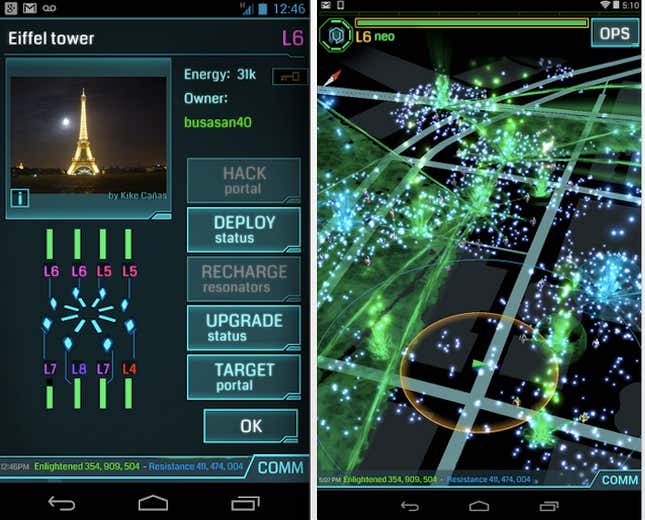
What if the world’s biggest online advertising company could figure out a way to go beyond showing ads? What if it could actually get people to go into stores?
That’s exactly what Google has achieved with Ingress, a popular but still relatively unknown multiplayer online game that requires players to go out into the real world to progress. This morning, Google released a version of the game for iOS users, bringing it to the the richer, more freely spending crowd that uses iPhones.
Here’s how it works: Like players of Geocaching, which describes itself as a real-world treasure hunt, Ingress players must get off the couch and go out into the physical world in order to capture ”portals.” Anything can be a portal—a train station, a mailbox, even a shop. The game combines the best of online multiplayer games with exercise and recreation. Enthusiastic players make new friends through the game too.
Made by Niantic, which functions as a start-up within Google, Ingress was released in December 2012 as an invite-only beta. The game only went public—for Android users—in October last year. In that time, it has been downloaded over five million times, though the actual number of players is estimated to be much lower. Observers were initially baffled by Google’s motivations for the game. Some speculated that perhaps it was a way for the internet giant to collect real-world walking paths and patterns to help make its map products ever better.
But the advertising rewards are also immense. While the number of Ingress players is estimated at a million or less—a vanishingly small number compared to the audience for ads on Google search and other products—there is a great deal more value for advertisers in having a users walk into shops than ignore a blink-and-you-miss-it ad on the web. Duane Reade, a pharmacy chain in the US, last year became the first firm to advertise in this manner with Ingress. Here’s how The Verge described it at the time:
In the coming days, each Duane Reade store will place some kind of game asset inside the premises, as well as a participation sticker outside. Players will then come in, find the asset, and scan its code (which can only be used once but can be shared with others) to unlock one of several in-game tools or weapons.
More recently, JCDecaux, one of the world’s biggest outdoor advertisers, teamed up with Ingress to turn some of its display ads into portals. Nick Hide of CNET.com reports that London portals are often pick-up locations for Zipcar, a car-sharing company.